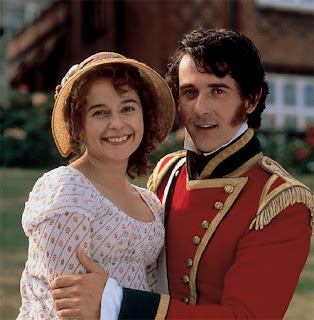Character Analysis: George Wickham
Jane Austen uses the character of George Wickham to set up the stage for pivotal points of the novel-- they are almost all in some way connected to him, to name a few:
'Mad bad, and dangerous to know' his true character is veiled by:
 First, let's examine his motives in seeking Elizabeth. Certainly Lizzy was attractive with fine eyes and a lively disposition but she also, no doubt, had an astute look about her.
First, let's examine his motives in seeking Elizabeth. Certainly Lizzy was attractive with fine eyes and a lively disposition but she also, no doubt, had an astute look about her.
On reflection of the Darcy incident, Mr. Wickham must have been worried that someone noticed their reactions and he knew if anyone did it was Elizabeth Bennet. In that case he'd have to find out what her opinion is of Darcy and how he can manipulate it in his favor.
Wickham is also gambler, as we learn later on in the novel, true, he wouldn't win very much at Mrs. Phillips party but I'd imagine even a few shillings or pounds would tempt Wickham.
The fact that he turns down whist and doesn't participate in the lottery tickets further implies he had a particular reason in speaking to Elizabeth and carefully leads the conversation:
As he begins to spin his tale the reader is no doubt shocked at the hypocrisy and lies that are clearer upon a second reading :
Perhaps the only honest sentences of his tale to Elizabeth are:
He is a man of 'vicious propensities and want of principle, which he was careful to guard' a chameleon in a red coat that proves a fatal attraction to foolish Lydia Bennet but if Elizabeth was taken perhaps we ought not be so condemning of poor Lydia.
- Elizabeth's bad opinion and rejection of Mr. Darcy
- Mr. Darcy's letter
- Lizzy's development as a person in realizing her judgment isn't as clear as she thought
- Lydia's 'elopement'
'Mad bad, and dangerous to know' his true character is veiled by:
...the best part of beauty, a fine countenance, a good figure, and very pleasing address... a happy readiness of conversation -- a readiness at the same time perfectly correct and unassuming
 First, let's examine his motives in seeking Elizabeth. Certainly Lizzy was attractive with fine eyes and a lively disposition but she also, no doubt, had an astute look about her.
First, let's examine his motives in seeking Elizabeth. Certainly Lizzy was attractive with fine eyes and a lively disposition but she also, no doubt, had an astute look about her.On reflection of the Darcy incident, Mr. Wickham must have been worried that someone noticed their reactions and he knew if anyone did it was Elizabeth Bennet. In that case he'd have to find out what her opinion is of Darcy and how he can manipulate it in his favor.
Mr. Wickham was the happy man towards whom almost every female eye was turned, and Elizabeth was the happy woman by whom he finally seated himself; and the agreeable manner in which he immediately fell into conversation, though it was only on its being a wet night, and on the probability of a rainy season, made her feel that the commonest, dullest, most threadbare topic might be rendered interesting by the skill of the speaker.Note that it's a subtle warning to the reader that he can make the weather an interesting topic; he is a charmer and can have people 'listening with all their heart' if relating something of true importance. Even Mr. Darcy's excellent father was taken in:
...My father was not only fond of this young man’s society, whose manners were always engaging, he had also the highest opinion of him.
Wickham is also gambler, as we learn later on in the novel, true, he wouldn't win very much at Mrs. Phillips party but I'd imagine even a few shillings or pounds would tempt Wickham.
The fact that he turns down whist and doesn't participate in the lottery tickets further implies he had a particular reason in speaking to Elizabeth and carefully leads the conversation:
He inquired how far Netherfield was from Meryton; and after receiving her answer, asked in an hesitating manner how long Mr. Darcy had been staying there.
As he begins to spin his tale the reader is no doubt shocked at the hypocrisy and lies that are clearer upon a second reading :
I have no reason for avoiding him...
...I must have employment...
...There was just such an informality in the terms of the bequest as to give me no hope from law. A man of honour could not have doubted the intention, but Mr. Darcy chose to doubt it
Perhaps the only honest sentences of his tale to Elizabeth are:
I have been a disappointed man, and my spirits will not bear solitude... I had forfeited all claim to it by extravagance, imprudence [of course he changes the context of this one and was nevertheless compensated for the living]......We [Darcy vs. Wickham] are very different sort of men
He is a man of 'vicious propensities and want of principle, which he was careful to guard' a chameleon in a red coat that proves a fatal attraction to foolish Lydia Bennet but if Elizabeth was taken perhaps we ought not be so condemning of poor Lydia.




Comments